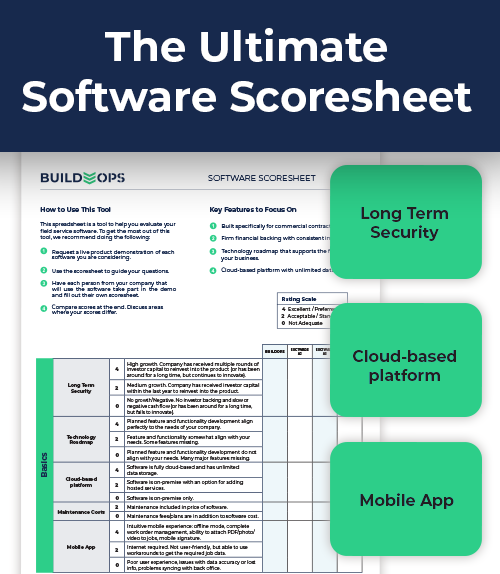how to become a general contractor
How to Get Started as a General Contractor
Jan. 21, 2021

The construction industry can be extremely rewarding if you're a hard worker and a fast learner, but it's even more lucrative when you're the head honcho on every site. Solo commercial contractors often find themselves subcontracted on many big jobs, and yet, it's only a small step up to become the guy signing off on the dotted lines. That's a general contractor for you.
In general contracting, you're responsible for the complete project, whether it's a new installation, maintenance contract , or simple repairs. It means bigger responsibilities and more stress, but it's absolutely worth it.
If there was ever a good time to go big and become a general contractor, this is it. As history has shown us, the construction industry booms after a period of economic recession. In this article, we're going to discuss what it takes to become a general contractor and what you need to do to get started.
Before You Get Started: Eligibility Criteria for General Contractors
The minimum requirements for prime contractors – that's another name for general contractors – are set quite low. A high school diploma or GED, the ability to work legally in the US, a clean work record, and a bit of relevant work experience is all you need to start working your way towards a general contracting business.
However, starting a GC business and running one successfully are two different things. Before you can land clients, secure funding, or even hire skilled labor, you've got to demonstrate that you know where you're going and have what it takes to run a successful GC business.
That is why most commercial general contractors have stellar personal qualifications including Bachelor's and Master's degrees, years of experience, certifications, and licensing.
Assuming you've already been specializing in something like commercial plumbing or HVAC and want to expand your scope, below are a few tips for success in general contracting.
Build Your Education
Modern building construction projects are massive and highly sophisticated. The engineering, architectural, legal, and financial aspects become more challenging every day, and we're past the stage where a mere GED will be enough no matter how many years of experience you have.
You'll likely need a diploma or bachelor's degree in building and construction, as well as some relevant engineering courses. If nothing else, the paperwork will be crucial in helping you build client confidence so that you can land big projects. If a full-blown degree is out of reach, consider taking some online courses, seeing if your local college will let you audit classes, or even prep yourself with YouTube videos.
Grow Your Skills
Running a successful GC means really understanding the business side of things. Managing field teams, handling clients, running the financials, meeting industry regulations, and dealing with all the paperwork that comes with it — this is your every day.
That said, you'll need to sharpen a few skills first:
- Bidding on projects
- Financial management, budgeting, and bookkeeping
- Managing subcontractors
- Complying with building regulations
- Managing clients and their expectations
- Training in HVAC safety
- Understanding commercial HVAC
A lot of these skills are what you'll learn by doing, on the job Before opening your own GC, it's generally a good idea to work for one first — get paid to learn and hone your business management skills.
Once you've completed your education and on-the-job training, sit for contractor exams if they're required in your state. If they aren't, take them anyway if you can. The exams are granted at the city or state level and are designed to test on law, business management, financial management, safety and risk control, among others. (At the very least, the study materials for these exams will be a massive help.)
With this certification, you can get licensing and acquire clients much more easily. During this time, it's also a good idea to put aside some funding. It can take 3 or more years to properly prepare for running your own GC, so start to save money, buy tools, and build up credit in advance.
Getting Started With a General Contractor Business
When you're ready to take the leap and bring your GC business to life, you'll have to do a bit of planning and paperwork.
Create a Business Plan
A business plan is a roadmap to where you want your business to go. It defines everything from what type of entity your business will be (LLC, partnership, S or C corporation) to what type of contracts you want to be taking (HVAC, Plumbing, Electrical, etc.), where your clients will come from, expected expenses, growth plan, and so much more.
The business plan is where it gets real — where you really have to count the cost and draw up plans for the future. Of course, the banks will also need it to assess your eligibility for financing.
Get Certified and Licensed
There are complex licensing and certification requirements needed before a prime contractor business can start operating. These change from state to state, but there are a few that are either mandatory or very important, regardless.
For starters, you will need to get business insurance to cover yourself, your employees, and subcontractors on the job. Workers' comp is also mandatory in most states. Comp insurance compensates workers in case of on-the-job accidents, while business insurance coverage protects you in case of claims, damages, and lawsuits.
Secondly, you have to comply with OSHA safety regulations. Complying to these regulations can feel like a burden, but these are meant to idiot-proof your business and keep everyone safe.
The same thing goes with doing your own due diligence to prioritize and systematize safety among your team. How many HVAC technicians do you know who go through this HVAC safety checklist regularly? Probably not many, but that doesn't mean you can't find ways to incorporate it into their workflows .
Finally, you'll need to have contractor license bonds, also called Surety Bonds. These are guarantees similar to insurance, given to your clients as proof that you will complete the job as promised and stick to standard regulations, or they get their money back. General contractor license bonds are a necessary requirement for GC licensing in most states .
DOWNLOAD OUR ULTIMATE SOFTWARE SCORESHEET
Start Small to Build Your Reputation
After months to years of planning and execution, you can finally take your first client. But before you go bidding for government and large industrial contracts, you've got to have a portfolio of successful projects and happy clients. That means you have to gain traction by taking jobs where you can find them to build a solid reputation.
These jobs can be procured from your personal networks or relationships you've made along the way. Previous colleagues and employers, friends, family, and social platforms are all prime sources of "beginner" jobs that you can take to prove your worth. Make sure that you go above and beyond for these clients so that you get recommendations and referrals.
As you slowly build your client list, you also need to build your business administration and processes. For example, incorporating technology is one of the best ways to build a lean, mean team that can juggle demanding jobs successfully.
Consider Specializing (The Subcontractor Approach)
Becoming a general contractor can be extremely lucrative. That being said, another rewarding route to potentially explore is the subcontractor path. As a subcontractor, you'll specialize in a certain aspect of construction, such as HVAC, plumbing, mechanical, fire safety, permitting, or design. GCs often work with subcontractors in order to complete a project when they don't have someone on their own team who possesses a certain skill set.
Becoming a subcontractor is a great option for someone who wants to deepen their knowledge in a specific field while still owning their own business. You'll set your own rates and have your own clients, but you'll also get to work with GCs and likely develop partnerships with them.
In this case, a full-service platform such as BuildOps would help your business scale. Field service management software is essential for every subcontracting business to help with managing teams and customers on one easy platform. As the leading provider of purpose-built FSM software for contractors, the team BuildOps has designed a solution to help you connect your office to the field. Our services include:
- Dispatch
- Quoting
- Invoicing
- Customer management
- Project management
- Accounting functions and more
The right tech is as essential for successful job completion as having the right people. That's the reality of modern subcontracting business, and BuildOps is here to help. Get in touch with us for more about how our field service management platform can help you grow revenue, cut costs, and empower your team.
Comparing new commercial software?
We made it easy… Download this scoresheet and see if your favorite software makes the cut.

how to become a general contractor
Source: https://buildops.com/resources/how-to-become-a-general-contractor/
Posted by: conwellunnim1945.blogspot.com

0 Response to "how to become a general contractor"
Post a Comment